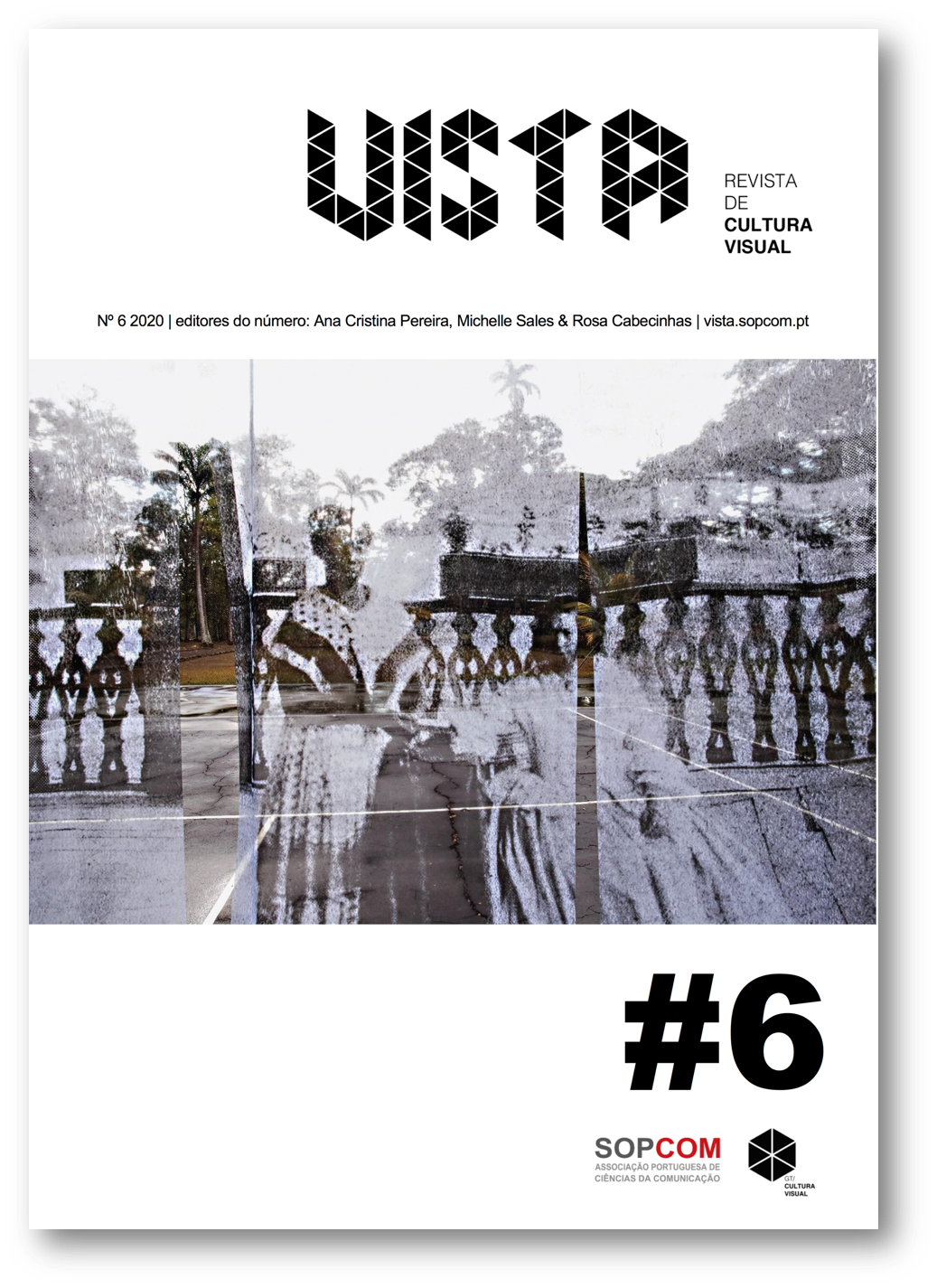Breaking Canons: Intersectional Feminism and Anti-Racism in the Work of Black Women Artists
DOI:
https://doi.org/10.21814/vista.3060Keywords:
intersectional feminism and anti-racism, black women artists, Grada Kilomba, Eurídice Kala aka Zaituna Kala, KeyezuaAbstract
In this essay, I will argue for the relevance of the visual production of several contemporary black women artists for the shattering of Eurocentric stereotypes and racist and patriarchal narratives, which, as legacies of the colonial and enslaving past, continue to wound the social and psychic lives of non-white people. While envisaging contemporary artistic practice as being in close dialogue with, or located within, other epistemic and cultural practices – such as the disciplinary fields of history and art history, and visual culture at large –, which have produced and reproduced racist discourses and racialized subjectivities for centuries, I will examine the ways in which black women artists break Eurocentric canons and counter racism, patriarchy, capitalism, homophobia, transphobia, and ableism from within the specific field of contemporary art, in between theory and practice, and drawing on the invaluable lessons of intersectional feminism. Relevant examples will be works by Grada Kilomba (Portugal, 1968), Eurídice Kala aka Zaituna Kala (Mozambique, 1987), and Keyezua (Angola, 1988). This essay will consider the ethico-political valences of such critiques through contemporary art, while not avoiding the problems that are inherent to the ways in which neo-liberal capitalism and white privilege remain structurally at the heart of numerous artistic institutions.
Downloads
References
Balona de Oliveira, A. (2017). A Decolonizing Impulse: Artists in the Colonial and Post- Colonial Archive, Or the Boxes of Departing Settlers between Maputo, Luanda and Lisbon. In Piçarra, M. C., Castro, T. (Eds.), (Re)Imagining African Independence: Film, Visual Arts and the Fall of the Portuguese Empire (pp. 185-204). Oxford: Peter Lang.
Balona de Oliveira, A. (2018, 26th January). Elas Aqui, os Cinquenta Anos, o Renascimento, os Senhores do Vento e o James Brown, Ou Cinco Impressões de Luanda (Uma das quais em Lisboa). Artecapital. Retrieved from: https://www.artecapital.net/perspetiva-205-ana-balona-de-oliveira-elas-aqui-os- cinquenta-anos-o-renascimento-os-senhores-do-vento-e-o-james-brown-ou-cinco- impressoes-de-luanda-uma-das-quais-em-lisboa-
Balona de Oliveira, A. (2019a). “Memórias da Plantação”, Anastácia, Dandara e Zumbi, o Paquete São José e as Roças de São Tomé, Ou Escravatura, Colonialismo e Racismo pelo Olhar das Artistas. In Bandeira Jerónimo, M., Monteiro, J. P. (Eds.), O Direito Sobre Si Mesmo: 150 Anos da Abolição da Escravatura no Império Português [exh. cat.] (pp. 155-164). Lisbon: Assembleia da República - Direcção de Informação e Cultura.
Balona de Oliveira, A. (2019b). “Supõe que a Verdade Fosse uma Mulher... E Porque Não?” Entrando de Lado, ou o “Gendering” e o “Blackening” de Histórias Coloniais, Anti- e Pós-Coloniais na Obra de Eurídice Kala aka Zaituna Kala. Revista Faces de Eva, Extra, 57-70. http://www.scielo.mec.pt/pdf/eva/nExtra/nextraa06.pdf
Balona de Oliveira, A. (2020a). “Plantation Memories”, Anastácia, Dandara, and Zumbi, the Slave Ship São José, and the Farms of São Tomé, Or Slavery, Colonialism, and Racism in the Work of Women Artists. Observatório (Obs*) (forthcoming).
Balona de Oliveira, A. (2020b). Circulating Capulanas, Wedding Gowns, and Black Dresses: Race and Gender across Time and Space in the Work of Eurídice Kala aka Zaituna Kala. In Ferreira, Â. (Ed.), Atlantica: Contemporary Art from Mozambique and its Diaspora. Lisbon: Hangar Books (forthcoming).
Bandeira Jerónimo, M. (2009). Livros Brancos, Almas Negras: A Missão “Civilizadora” do Colonialismo Português, 1870-1930. Lisbon: Imprensa de Ciências Sociais.
Bandeira Jerónimo, M., Monteiro, J. P. (Eds.) (2019). O Direito Sobre Si Mesmo: 150 Anos da Abolição da Escravatura no Império Português (exh. cat.). Lisbon: Assembleia da República - Direcção de Informação e Cultura.
Bhabha, H. K. (1994). The Location of Culture. London and New York: Routledge.
Cabrita Mateus, D., Mateus, A. (2011). Angola 61: Guerra Colonial: Causas e Consequências. Lisbon: Texto Editores.
Castro Henriques, I. (2019). De Escravos a Indígenas: O Longo Processo de Instrumentalização dos Africanos (Séculos XV-XX). Lisboa: Caleidoscópio.
Crenshaw, K. (1989). Demarginalizing the Intersection of Race and Sex: A Black Feminist Critique of Antidiscrimination Doctrine, Feminist Theory and Antiracist Politics. University of Chicago Legal Forum, 1989(1), 139-167. https://chicagounbound.uchicago.edu/cgi/viewcontent.cgi?article=1052&context=uclf
Davis, A. (1983). Women, Race and Class. New York: Vintage Books, Random House.
Dhada, M. (2016). O Massacre Português de Wiriamu, Moçambique 1972. Lisbon: Tinta da China.
Fanon, F. (2008 [1952, 1967]). Black Skin, White Masks. London: Pluto Press.
Ferguson, J. (2006). Global Shadows: Africa in the Neoliberal World Order. Durham, N.C., London: Duke University Press.
Ferreira de Carvalho, N. (Ed.) (2017). Grada Kilomba: Secrets to Tell (exh. cat.). Lisbon: MAAT/Fundação EDP.
Gilroy, P. (1993). The Black Atlantic: Modernity and Double Consciousness. London: Verso.
Gilroy, P. (2010). Darker than Blue: On the Moral Economics of Black Atlantic Culture. Cambridge, Mass., London: The Belknap Press of Harvard University Press.
Grada Kilomba (2015a). Plantation Memories: Part I. Retrieved from: https://www.youtube.com/watch?v=ftRjL7E5Y94
Grada Kilomba (2015b). Plantation Memories: Part II. Retrieved from: https://www.youtube.com/watch?v=SzU0TQxLnZs
Grada Kilomba (2015c). While I Write. Retrieved from: https://www.youtube.com/watch?v=UKUaOwfmA9w
Grada Kilomba (2016). Kosmos2 Labor#10 Video Installation: The Desire Project by Grada Kilomba. Retrieved from: https://vimeo.com/266296302; https://www.youtube.com/watch?v=3_862VjLVEA
Handler, J. S., Steiner, A. (2006). Identifying Pictorial Images of Atlantic Slavery: Three Case Studies. Slavery and Abolition, 27(1), 51-71. http://jeromehandler.org/wp- content/uploads/2009/07/Pictorial-Images-06.pdf
Handler, J. S., Hayes, K. E. (2009). Escrava Anastácia: The Iconographic History of a Brazilian Popular Saint. African Diaspora, 2, 25-51. http://jeromehandler.org/wp- content/uploads/Escrava-09.pdf
Hill Collins, P. (2009). Black Feminist Thought: Knowledge, Consciousness and the Politics of Empowerment. New York: Routledge.
hooks, b. (2015). Ain’t I a Woman: Black Women and Feminism. New York: Routledge. Keyezua Atelier (2017). Beautiful People Know. Retrieved from: https://www.youtube.com/watch?v=hNDGu6tqw3w
Kilomba, G. (2008). Plantation Memories: Episodes of Everyday Racism. Münster: Unrast Verlag.
Mama, A. (1995). Beyond the Masks: Race, Gender and Subjectivity. London, New York: Routledge.
Mbembe, A. (2001). On the Postcolony. Berkeley, London: University of California Press.
Mbembe, A. (2002). Necropolitics. Public Culture, 15 (1), 11-40. https://read.dukeupress.edu/public-culture/article/15/1/11/31714/Necropolitics
Mbembe, A. (2013). Critique de la raison nègre. Paris: La Découverte.
Mbembe, A. (2016). Politiques de l’inimitié. Paris: La Découverte.
Monteiro, J. P. (2018). Portugal e a Questão do Trabalho Forçado: Um Império sob Escrutínio (1944-1962). Lisbon: Edições 70.
Nascimento Rodrigues, I. (2018). Espectros de Batepá: Memórias e Narrativas do Massacre de 1953 em São Tomé e Príncipe. Porto: Afrontamento.
Njami, S. (Ed.) (2016). Dak’art 12: La Cité dans le jour bleu: Réenchantements (vol.1), Contours (vol. 2) [exh. cat.]. Bielefeld: Kerber Verlag,
O'Laughlin, B. (2002). Proletarianisation, Agency and Changing Rural Livelihoods: Forced Labour and Resistance in Colonial Mozambique. Journal of Southern African Studies, 28(3), 511-530. https://www.tandfonline.com/doi/abs/10.1080/0305707022000006495
Pape, D., Rebelo de Andrade, R. (2013). As Roças de São Tomé e Príncipe. Lisbon: Tinta da China.
Rapazote, J. (Ed.). (2018). Grada Kilomba: The Most Beautiful Language [exh. cat.]. Lisbon: Galerias Municipais/EGEAC.
Retro Black Media (2010). Afro Sheen Ad 4. Retrieved from: https://www.youtube.com/watch?v=IrZ3c0x14TE
Seibert, G. (2012). Tenreiro, Amador e os Angolares ou a Reinvenção da História da Ilha de São Tomé. Realis – Revista de Estudos Anti-Utilitaristas e Pós-Coloniais, 2(2), 21-40. https://periodicos.ufpe.br/revistas/realis/article/view/8764/8739
Seibert, G. (2015). Colonialismo em São Tomé e Príncipe: Hierarquização, Classificação e Segregação da Vida Social. Anuário Antropológico, 2, 99-120. https://journals.openedition.org/aa/1411
Spivak, G. C. (1988). Can the Subaltern Speak? In Nelson, C., Grossberg, L. (Eds.), Marxism and the Interpretation of Culture (pp. 271-313). Basingstoke: Macmillan.
Spivak, G. C. (1999). A Critique of Postcolonial Reason: Toward a History of the Vanishing Present. Cambridge, Mass and London: Harvard University Press.
Vergès, F. (2017). Le ventre des femmes: Capitalism, racialisation, féminisme. Paris: Albin Michel.
Vergès, F. (2019). Un féminisme décolonial. Paris: La Fabrique.
Volz, J., Rebouças, J., (Eds.) (2016). 32a Bienal de São Paulo: Incerteza Viva [exh. cat.]. São Paulo: Fundação Bienal de São Paulo.
Downloads
Published
How to Cite
Issue
Section
License

This work is licensed under a Creative Commons Attribution 4.0 International License.
Authors own the copyright, providing the journal with the right of first publication. The work is licensed under a Creative Commons Attribution 4.0 International License.













